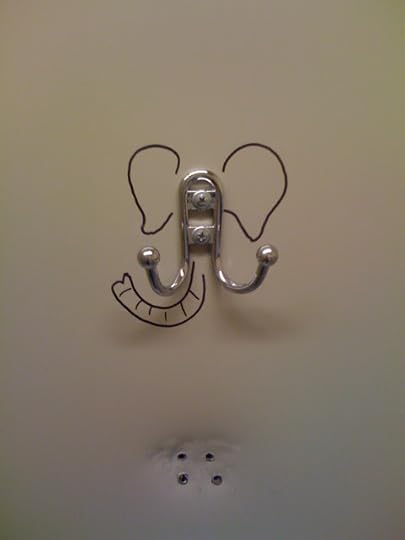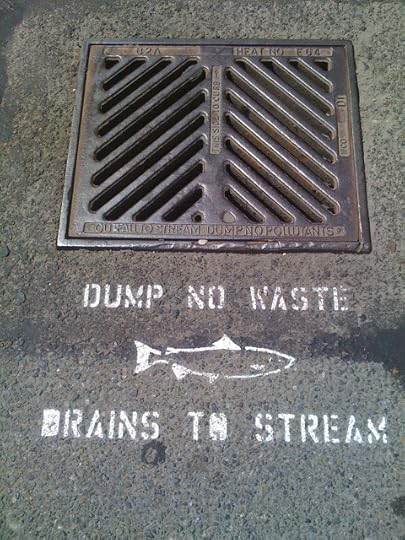Luna (Lindsey) Corbden's Blog, page 8
June 8, 2012
Silly Autocorrect (photo)
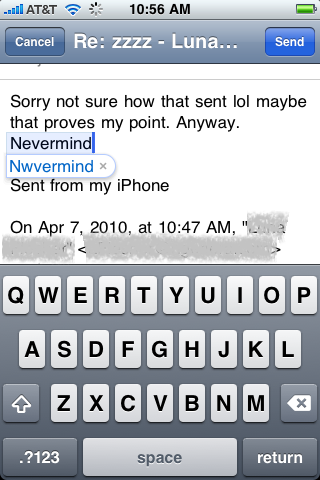 Back when I had an iPhone.Yes, very helpful, Autocorrect. These things always happen after a long string of compounding errors. In this case, my phone kept sending messages before I was done writing them, and then it went and wouldn't let me write the word "Nevermind". I think I retyped it three times.
Back when I had an iPhone.Yes, very helpful, Autocorrect. These things always happen after a long string of compounding errors. In this case, my phone kept sending messages before I was done writing them, and then it went and wouldn't let me write the word "Nevermind". I think I retyped it three times.
Published on June 08, 2012 08:30
June 7, 2012
Wayward Reading - June 29th
Two exciting announcements this week!
Reading at Wayward Coffeehouse
I am booked for my first debut live author reading at Wayward Coffeehouse with my friend, horror author Michael Montoure!
Michael has a long background of doing readings at Seattle venues and at cons in various places. His short story collection, Slices, is awesome, and available at Amazon in Kindle and print.
I have performed an author reading once before, but on video. This will be my first live performance.
I will be reading three pieces:
Let the Bugs Work Themselves Out , a sci-fi short story about ants and hackers. The Metro Gnome , a story set in my Dreams by Streetlight world, about a gnome on the 358 bus.An excerpt from Emerald City Dreamer .
Details: Wayward Coffeehouse in north Seattle. June 29th, 8pm-10pm. Directions
The other announcement is my book blog tour, starting next week.
Reading at Wayward Coffeehouse
I am booked for my first debut live author reading at Wayward Coffeehouse with my friend, horror author Michael Montoure!
Michael has a long background of doing readings at Seattle venues and at cons in various places. His short story collection, Slices, is awesome, and available at Amazon in Kindle and print.
I have performed an author reading once before, but on video. This will be my first live performance.
I will be reading three pieces:
Let the Bugs Work Themselves Out , a sci-fi short story about ants and hackers. The Metro Gnome , a story set in my Dreams by Streetlight world, about a gnome on the 358 bus.An excerpt from Emerald City Dreamer .
Details: Wayward Coffeehouse in north Seattle. June 29th, 8pm-10pm. Directions
The other announcement is my book blog tour, starting next week.
Published on June 07, 2012 11:48
Blog Tour - June 11th to July 9th
Starting next week, on June 11th, I start a month-long blog tour. My schedule is pretty packed. This list may change.
This blog tour was made possible by Bewitching Book Tours. Roxanne has made everything easy, and I am pleased at how many doors she was able to open for me.
What is a blog tour? During the month, Emerald City Dreamer will be featured on many different book blogs, in the form of reviews, author interviews, and guest posts. It's a great way for readers to see what book bloggers think of my novel and to learn more about me. I hope you will check out some of these great blogs, as they are a way for you to learn more about other books.
As these dates pass, I will update the links to point directly to my post. For now, they point to the blog.
June 11
It's Raining Books – Promo
June 12 ReaWrite – Promo and Review
June 15 Rabid Reads – Guest postI Just Wanna Sit Here and Read – PromoA Dream Within A Dream – Promo and Review
June 18Fang-tastic Books – Guest postBooks, Books, and More Books – Review
June 20Celestial Reviews – Guest post
June 21Roxanne’s Realm – Promo
June 22 Guest BlogThe Creatively Green Write at Home Mom – Guest Post
June 23JeanzBookReadNReview – Interview
June 25The Full Fang – Interview
June 27The Speculative Salon – Interview
June 29 - 8pm
Debut Live Author Reading at Wayward Coffeehouse
July 3 Manga Maniac Cafe – ReviewEverything to Do With Books – ReviewCoffee Addicted Writer – Review
July 5 Book Reviews, Fiction Reflections, N' More – Interview and ReviewFiction Fascination – Guest Post
July 9 Bornean Bookworm Reads – Guest PostThe Wormhole – Interview and ReviewSimply Infatuated – Interview
This blog tour was made possible by Bewitching Book Tours. Roxanne has made everything easy, and I am pleased at how many doors she was able to open for me.
What is a blog tour? During the month, Emerald City Dreamer will be featured on many different book blogs, in the form of reviews, author interviews, and guest posts. It's a great way for readers to see what book bloggers think of my novel and to learn more about me. I hope you will check out some of these great blogs, as they are a way for you to learn more about other books.
As these dates pass, I will update the links to point directly to my post. For now, they point to the blog.
June 11
It's Raining Books – Promo
June 12 ReaWrite – Promo and Review
June 15 Rabid Reads – Guest postI Just Wanna Sit Here and Read – PromoA Dream Within A Dream – Promo and Review
June 18Fang-tastic Books – Guest postBooks, Books, and More Books – Review
June 20Celestial Reviews – Guest post
June 21Roxanne’s Realm – Promo
June 22 Guest BlogThe Creatively Green Write at Home Mom – Guest Post
June 23JeanzBookReadNReview – Interview
June 25The Full Fang – Interview
June 27The Speculative Salon – Interview
June 29 - 8pm
Debut Live Author Reading at Wayward Coffeehouse
July 3 Manga Maniac Cafe – ReviewEverything to Do With Books – ReviewCoffee Addicted Writer – Review
July 5 Book Reviews, Fiction Reflections, N' More – Interview and ReviewFiction Fascination – Guest Post
July 9 Bornean Bookworm Reads – Guest PostThe Wormhole – Interview and ReviewSimply Infatuated – Interview
Published on June 07, 2012 11:19
June 6, 2012
RIP Ray Bradbury
I was greatly inspired by Bradbury as a child. I remember taking an SAT test in 1992, and recognizing a passage from Dandelion Wine they'd used.
Our family had tapes with the Bradbury 13 dramatizations done by BYU in 1984. Just last month I wanted to share them with the kids, found them, and listened to some of them on vacation.
Some of these stories had huge impacts on me, especially a "Sound of Thunder", about time travel and the effects even small changes could have. "The Wind" terrified me, and kept me up late, listening to the wind in Eastern Washington, afraid it might get in.
On Twitter today, someone pointed me at these audio productions done in the 1950s, and clearly inspired the later Bradbury 13.
I never got around to reading the Martian Chronicles, but I saw the poorly-made movies. And obviously Fahrenheit 451, one of the greatest dystopian novels of all time.
He is one of the three greatest classic SF authors, those who founded and popularized science fiction. They taught literary snoots that sci-fi had something important to say; that as a genre, it could rise above the pulp rubbish. Of these three -- Asimov, Clarke, and Bradbury -- Bradbury was the last alive.
Now they are all gone, and it is up to the generations of new guards to try to fill their shoes; to try to grasp, here in the shadow of a possible mind-boggling singularity, what the future may hold. To intuit what dangers there may be, that we might warn of them. To cast about for hope that we may promise it. It is a tall order, when much of what they foretold has come true.
If you're a writer, or just want to know more about Bradbury's life and creative mind, "Zen in the Art of Writing" is short and very good.
Nothing is more inspiring and mystic to me than reading biographies and seeing documentaries on the lives of old sci-fi writers. Zen falls into that category. It is easy to imagine him sitting at a typewriter in 1953. It is hard to imagine him predicting a future where technology might make it possible for there to be no books.
Thank you Ray, for being on my dad's shelf as I grew up. If only I could write half as well as you. You changed the world; you changed my world. Your words will outlive us all.
Published on June 06, 2012 10:38
Video Store Art (photos)
Every year, Roland and I take a weekend trip to Leavenworth, WA for our anniversary from the time we met. This weekend will be our fourth trip.
Here are some photos I took on our first year. There's a little independent video store off the main drag, obviously intended for the locals. Also obviously, it was run by geeks, since an action figure of some kind guarded each aisle. I believe they also had a video game console and a couch at the back of the room, but my memory is hazy. We rented a pile of movies, including United 93 and the original version of Let the Right One In, which the clerk highly recommended.
Most notable about this store was the ceiling. It was obvious from the different art styles, that they would lend a ceiling tile out to whoever wanted to add something. I captured some of my favorites.
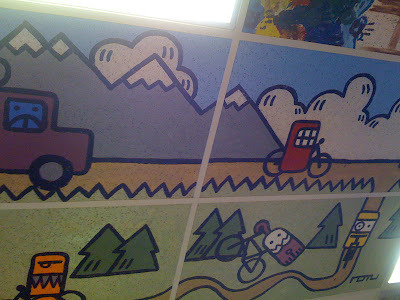
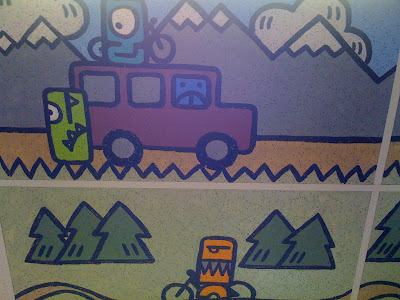
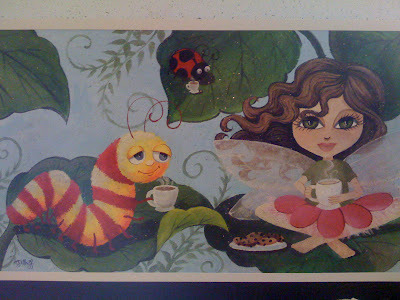
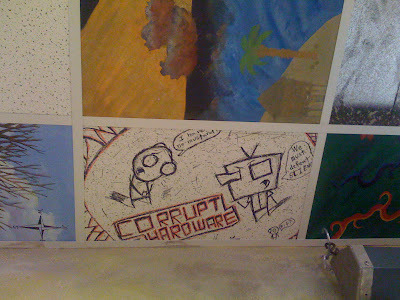
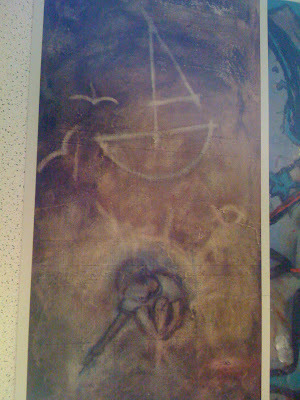

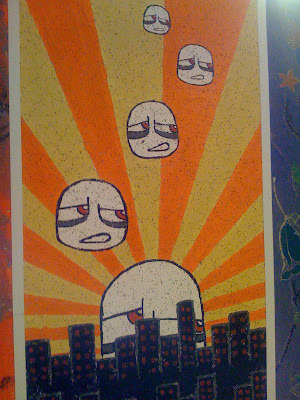

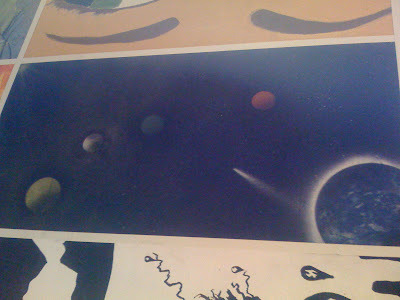
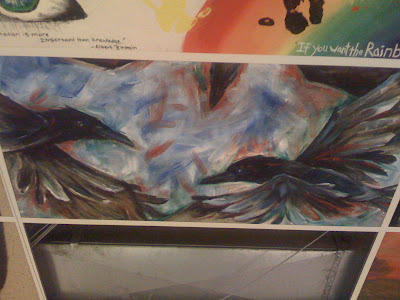


Here are some photos I took on our first year. There's a little independent video store off the main drag, obviously intended for the locals. Also obviously, it was run by geeks, since an action figure of some kind guarded each aisle. I believe they also had a video game console and a couch at the back of the room, but my memory is hazy. We rented a pile of movies, including United 93 and the original version of Let the Right One In, which the clerk highly recommended.
Most notable about this store was the ceiling. It was obvious from the different art styles, that they would lend a ceiling tile out to whoever wanted to add something. I captured some of my favorites.











Published on June 06, 2012 08:00
June 4, 2012
Gender Politics on Game Night: "Apples to Apples" vs "Blokus"
I love games. I love games of every type: LARP, PC, console, board, card, RPG, strategy, and puzzle games. I like games that are difficult, that make me think. And I love games where I can sit back and relax and do something mindless for hours. I love meaningless social games where everyone wins. And hardcore competitive games where the loud shout of "Headshot!" booms bass from my speakers in a crowded room of a LAN party.
I'm really good at many games, and pretty good at most games. I used to avoid games I totally suck at, but lately I can play them without caring too much about winning.
For many years, off and on, I've hosted game nights where random friends show up bearing games and snacks. A card or board game is selected by democratic process, and fun is had by all.
A few years ago, I attended a large game night with twenty or thirty attendees in a large house. Some of the people I knew pretty well, and others were new to me. We had enough people for two or three simultaneous games. At some point, Apples to Apples was starting up in the living room, and Blokus was coming out the dining room.
In case you're not familiar, let me describe these games. Apples to Apples is a party game that large groups can play. The rules and strategy are very simple.
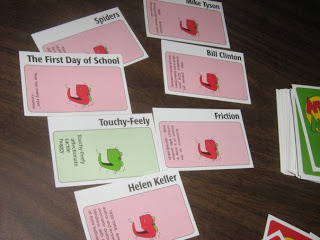 A very girly card played during a very girly game.
A very girly card played during a very girly game.
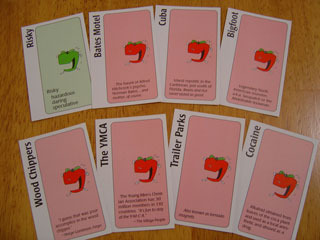 In this example, "Risky", I'd choose "Cocaine"... because when I use a wood chipper, I know exactly who I'm putting in there and why.Blokus is a very different game. There are a fixed number of players, up to four, and four works best. You are given a pile of brightly colored geometric shapes and a series of specific rules on how to place them on the board. Your goal is to lay down as many of the pieces as possible while blocking your opponents' ability to do the same. It is a highly competitive game requiring feats of logic.
In this example, "Risky", I'd choose "Cocaine"... because when I use a wood chipper, I know exactly who I'm putting in there and why.Blokus is a very different game. There are a fixed number of players, up to four, and four works best. You are given a pile of brightly colored geometric shapes and a series of specific rules on how to place them on the board. Your goal is to lay down as many of the pieces as possible while blocking your opponents' ability to do the same. It is a highly competitive game requiring feats of logic.
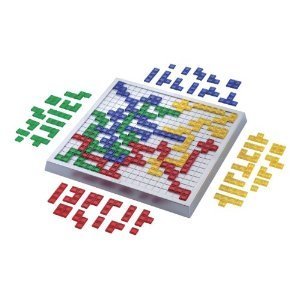 The only 8-bit board game.These two games could not be any more different from each other. And I love both equally. Depending on who I'm playing with, I'm usually more likely to win Blokus than Apples to Apples... and as I said, everyone wins Apples to Apples.
The only 8-bit board game.These two games could not be any more different from each other. And I love both equally. Depending on who I'm playing with, I'm usually more likely to win Blokus than Apples to Apples... and as I said, everyone wins Apples to Apples.
So we're at this party, where an Apples to Apples game is forming. I'm standing in the dining room with two other guys, and we're trying to talk another guy into being the fourth player in Blokus. One of the guys, someone I've not met before, says something like, "It's better than that girl-game they've got going in there."
Errrrt. Time to bust out my newly-formed infant inner-feminist.
There was a time when I'd let this comment slide. After all, who wants to be the rude angry bra-burner, when he's perfectly innocent just ignorant and we're all just trying to have a little fun? The fear bubbles up -- how am I going to put this complicated concept into words he'll understand?
I turned on him and opened my mouth in spite of my fears. I said, "What?"
He repeats what he'd said, then makes some excuse. "You know, it's a girl-game. What's wrong with that?"
"And I suppose Blokus is a boy's game?"
He nods, a little sheepishly, but only a little. "It's no big deal," he says. "You know what I mean."
"It is a big deal," I say. Then I explain to him, exactly and persuasively, what I mean. I ask him, "Do you work in the IT field?" Most guys at these Seattle game nights are. He nods.
At this point in my life, I had worked in IT for ten years. Ask any woman who has worked in IT for long. I had experienced what most of us have:
A former boss spent most of our conversations staring at my breasts.I'd been denied promotions, only to have outside male-hires fill those positions. When answering the tech line on the phone, I'd heard the words, "I'm sorry, I was trying to reach tech support... can you transfer me?" more than once.I'd had persuasive arguments for decisions ignored until my male underlings said the same things to the same people, and then the decisions were made. I was repeatedly honored for being an awesome "webmistress", then a "guru", then a "rockstar", yet continually made 40% of the market average for my position. If you had any kind of computer problem, I could solve it, but had a hard time convincing a lot of men that my opinions were worth anything. I went years thinking I was the only women this ever happened to.I also had won almost every Blokus game I'd played up to that point.
So I say to him, "Most likely you are or will be in a position to hire."
He nods.
"And you think that women are good at social word-association touchy-feeling games, and uninterested in logic games. Which means you may generally think women are bad at logic."
At this point he says something about thinking not all women were bad at logic. Obviously some women are good at logic.
"That's a problem," I said. "Because the IT field requires logic as a primary skill. Someday, you will interview two applicants of equal experience and skills. One will be a woman, and the other a man. And the woman will have to somehow prove to you that she logical enough to get the job. The man won't. That is why it's a big deal."
He looked abashed. He looked convinced. We went on to play Blokus, and I won. I pwned three guys in a competitive game of logic and strategy, and I hope at least one will someday interview a woman and remember that night. And that she will get the job. And that she will be treated well at that job, and that her opinion will matter, and that she will have equal opportunities for advancement.
This personal story is important on this week when a sexual harassment lawsuit is beginning in Silicon Valley. Liberal geeks on the West Coast, in the IT field, consider themselves open minded, advanced, pushing the envelope not just in the tech fields, but in culture and social interaction as well. The geek men in Seattle have long hair and wear kilts and T-Shirts with swear words and they are sex-positive and tolerant and they're well-read on advanced concepts of political theory and history and .. well, they're aware, and they're smart.
Geeks should know better. Yet according to employment statistics, they don't. According to that one guy, at that one game night, they don't. Women are less likely to enter the computer field, less likely to climb the ladder to management and executive levels, less likely to make as much as men in the same positions, and more likely to leave the computer field for a new career. (I did.)
There are a lot of reasons for these stats, and I'm willing to acknowledge there are many factors, including pregnancy, women's difficulty with knowing how to negotiate, and women's tendency to try to be "nice".
Yet I cannot overstate how men's attitudes towards women play a direct role in keeping women discouraged. I was strongly motivated in my career, not only to make more money, but to influence my company. No matter where I worked, I always wanted to help my company succeed. I wanted to make operations more efficient, I wanted to make our systems run as smoothly as possible. I wanted our products to be better. And I invested a lot of thought and energy at each company towards these goals. I didn't see myself as any different than my male co-workers. But they did.
Being shot down repeatedly is demoralizing enough. To know that at least some of those times I was dismissed because of my gender is intolerable. At one company, early in my career, I'd been shot down so many times, I remember finally giving in and giving up. (Especially when they kept hiring men for the IT Manager role that I was basically doing, without the title or pay.) I decided to stop rocking the boat and just settle into the shoes they wanted me to fill... just fix the computers and make everything run, without a budget or the authority to make decisions that no one was making. I literally kept the network together with duct tape.
What they needed: A smart, driven person to make decisions and keep the network running.
What they had: A smart, driven person to make decisions and keep the network running who happened to be female.
The Silicon Valley lawsuit story combines with another new story. Global labor statistics reveal the jobs most difficult to fill. Even with unemployment at 8.2%, STEM (Science, Technology, Engineering, Math) jobs continue to go unfilled at crippling rates, especially in hard-logic roles like Infosec and Network Architecture (two fields which were options on my career path). Of the top five hardest positions to fill, STEM fields make up four of them, including IT jobs. 49% of companies in the US have difficulty filling jobs.
These numbers will have a huge impact on our country's role as a technology innovator. It will have a huge impact on our GDP.
Is it just a coincidence that fewer women are entering these fields during the same period that these fields are starving for employees? Women make up half of our population -- shouldn't we be represented 50/50 in STEM jobs at IT firms? And shouldn't women help run these companies? I worked for five tech companies in my career, and with one exception where a small consulting firm was started and owned by a woman, the only women in C-level positions were in HR and Marketing.
Gender stereotypes might be funny to joke about at parties. They might not seem like a "big deal". It's all good. It's just game night. But real women are being hired and fired based on that stereotype. Women who could contribute. Women who might help your bottom line. Women who probably would take your company to the next level against your competitors, if only you'd listen to them, if only you'd give them credit, and if only you'd pay them what they're worth. Women who could help keep this economy afloat if society would only stop barring and discouraging them from positions that are desperately needed.
One thing I can say for sure. This woman will gladly challenge you to a game of Blokus, because there's a strong chance I'll win.
I'm really good at many games, and pretty good at most games. I used to avoid games I totally suck at, but lately I can play them without caring too much about winning.
For many years, off and on, I've hosted game nights where random friends show up bearing games and snacks. A card or board game is selected by democratic process, and fun is had by all.
A few years ago, I attended a large game night with twenty or thirty attendees in a large house. Some of the people I knew pretty well, and others were new to me. We had enough people for two or three simultaneous games. At some point, Apples to Apples was starting up in the living room, and Blokus was coming out the dining room.
In case you're not familiar, let me describe these games. Apples to Apples is a party game that large groups can play. The rules and strategy are very simple.
 A very girly card played during a very girly game.
A very girly card played during a very girly game. In this example, "Risky", I'd choose "Cocaine"... because when I use a wood chipper, I know exactly who I'm putting in there and why.Blokus is a very different game. There are a fixed number of players, up to four, and four works best. You are given a pile of brightly colored geometric shapes and a series of specific rules on how to place them on the board. Your goal is to lay down as many of the pieces as possible while blocking your opponents' ability to do the same. It is a highly competitive game requiring feats of logic.
In this example, "Risky", I'd choose "Cocaine"... because when I use a wood chipper, I know exactly who I'm putting in there and why.Blokus is a very different game. There are a fixed number of players, up to four, and four works best. You are given a pile of brightly colored geometric shapes and a series of specific rules on how to place them on the board. Your goal is to lay down as many of the pieces as possible while blocking your opponents' ability to do the same. It is a highly competitive game requiring feats of logic.  The only 8-bit board game.These two games could not be any more different from each other. And I love both equally. Depending on who I'm playing with, I'm usually more likely to win Blokus than Apples to Apples... and as I said, everyone wins Apples to Apples.
The only 8-bit board game.These two games could not be any more different from each other. And I love both equally. Depending on who I'm playing with, I'm usually more likely to win Blokus than Apples to Apples... and as I said, everyone wins Apples to Apples.So we're at this party, where an Apples to Apples game is forming. I'm standing in the dining room with two other guys, and we're trying to talk another guy into being the fourth player in Blokus. One of the guys, someone I've not met before, says something like, "It's better than that girl-game they've got going in there."
Errrrt. Time to bust out my newly-formed infant inner-feminist.
There was a time when I'd let this comment slide. After all, who wants to be the rude angry bra-burner, when he's perfectly innocent just ignorant and we're all just trying to have a little fun? The fear bubbles up -- how am I going to put this complicated concept into words he'll understand?
I turned on him and opened my mouth in spite of my fears. I said, "What?"
He repeats what he'd said, then makes some excuse. "You know, it's a girl-game. What's wrong with that?"
"And I suppose Blokus is a boy's game?"
He nods, a little sheepishly, but only a little. "It's no big deal," he says. "You know what I mean."
"It is a big deal," I say. Then I explain to him, exactly and persuasively, what I mean. I ask him, "Do you work in the IT field?" Most guys at these Seattle game nights are. He nods.
At this point in my life, I had worked in IT for ten years. Ask any woman who has worked in IT for long. I had experienced what most of us have:
A former boss spent most of our conversations staring at my breasts.I'd been denied promotions, only to have outside male-hires fill those positions. When answering the tech line on the phone, I'd heard the words, "I'm sorry, I was trying to reach tech support... can you transfer me?" more than once.I'd had persuasive arguments for decisions ignored until my male underlings said the same things to the same people, and then the decisions were made. I was repeatedly honored for being an awesome "webmistress", then a "guru", then a "rockstar", yet continually made 40% of the market average for my position. If you had any kind of computer problem, I could solve it, but had a hard time convincing a lot of men that my opinions were worth anything. I went years thinking I was the only women this ever happened to.I also had won almost every Blokus game I'd played up to that point.
So I say to him, "Most likely you are or will be in a position to hire."
He nods.
"And you think that women are good at social word-association touchy-feeling games, and uninterested in logic games. Which means you may generally think women are bad at logic."
At this point he says something about thinking not all women were bad at logic. Obviously some women are good at logic.
"That's a problem," I said. "Because the IT field requires logic as a primary skill. Someday, you will interview two applicants of equal experience and skills. One will be a woman, and the other a man. And the woman will have to somehow prove to you that she logical enough to get the job. The man won't. That is why it's a big deal."
He looked abashed. He looked convinced. We went on to play Blokus, and I won. I pwned three guys in a competitive game of logic and strategy, and I hope at least one will someday interview a woman and remember that night. And that she will get the job. And that she will be treated well at that job, and that her opinion will matter, and that she will have equal opportunities for advancement.
This personal story is important on this week when a sexual harassment lawsuit is beginning in Silicon Valley. Liberal geeks on the West Coast, in the IT field, consider themselves open minded, advanced, pushing the envelope not just in the tech fields, but in culture and social interaction as well. The geek men in Seattle have long hair and wear kilts and T-Shirts with swear words and they are sex-positive and tolerant and they're well-read on advanced concepts of political theory and history and .. well, they're aware, and they're smart.
Geeks should know better. Yet according to employment statistics, they don't. According to that one guy, at that one game night, they don't. Women are less likely to enter the computer field, less likely to climb the ladder to management and executive levels, less likely to make as much as men in the same positions, and more likely to leave the computer field for a new career. (I did.)
There are a lot of reasons for these stats, and I'm willing to acknowledge there are many factors, including pregnancy, women's difficulty with knowing how to negotiate, and women's tendency to try to be "nice".
Yet I cannot overstate how men's attitudes towards women play a direct role in keeping women discouraged. I was strongly motivated in my career, not only to make more money, but to influence my company. No matter where I worked, I always wanted to help my company succeed. I wanted to make operations more efficient, I wanted to make our systems run as smoothly as possible. I wanted our products to be better. And I invested a lot of thought and energy at each company towards these goals. I didn't see myself as any different than my male co-workers. But they did.
Being shot down repeatedly is demoralizing enough. To know that at least some of those times I was dismissed because of my gender is intolerable. At one company, early in my career, I'd been shot down so many times, I remember finally giving in and giving up. (Especially when they kept hiring men for the IT Manager role that I was basically doing, without the title or pay.) I decided to stop rocking the boat and just settle into the shoes they wanted me to fill... just fix the computers and make everything run, without a budget or the authority to make decisions that no one was making. I literally kept the network together with duct tape.
What they needed: A smart, driven person to make decisions and keep the network running.
What they had: A smart, driven person to make decisions and keep the network running who happened to be female.
The Silicon Valley lawsuit story combines with another new story. Global labor statistics reveal the jobs most difficult to fill. Even with unemployment at 8.2%, STEM (Science, Technology, Engineering, Math) jobs continue to go unfilled at crippling rates, especially in hard-logic roles like Infosec and Network Architecture (two fields which were options on my career path). Of the top five hardest positions to fill, STEM fields make up four of them, including IT jobs. 49% of companies in the US have difficulty filling jobs.
These numbers will have a huge impact on our country's role as a technology innovator. It will have a huge impact on our GDP.
Is it just a coincidence that fewer women are entering these fields during the same period that these fields are starving for employees? Women make up half of our population -- shouldn't we be represented 50/50 in STEM jobs at IT firms? And shouldn't women help run these companies? I worked for five tech companies in my career, and with one exception where a small consulting firm was started and owned by a woman, the only women in C-level positions were in HR and Marketing.
Gender stereotypes might be funny to joke about at parties. They might not seem like a "big deal". It's all good. It's just game night. But real women are being hired and fired based on that stereotype. Women who could contribute. Women who might help your bottom line. Women who probably would take your company to the next level against your competitors, if only you'd listen to them, if only you'd give them credit, and if only you'd pay them what they're worth. Women who could help keep this economy afloat if society would only stop barring and discouraging them from positions that are desperately needed.
One thing I can say for sure. This woman will gladly challenge you to a game of Blokus, because there's a strong chance I'll win.
Published on June 04, 2012 15:44
June 1, 2012
Elephant Stall (photo)
Published on June 01, 2012 09:00
May 29, 2012
Fighting Social Media Addiction Using e.ggtimer.com
You probably have ADHD and if you don't, it's been induced by the constant flow of small bits of information. It's like candy. It's sitting there on your desk, so you can reach out for just one more bite. Even if it's bad for you and rots your teeth and keeps you from getting anything done. (It's not a perfect metaphor.)
I never seem to get started writing. I'm always in a state of "get caught up on Twitter". Just need to check that Tumblr post, read that article on HuffPo, reply to some comments on a blog. Check email one more time. And don't get me started on Facebook! (Which is why I never get started on Facebook.)
Social media may be lowering our attention spans from minutes to seconds. There has been some criticism about the data used on that inforgraphic, but anecdotally, I know this to be true. On a busy social media day, I give every piece of information about 7 seconds, and if it fails to interest me, I'm on to the next thing.
When I finally do get caught up, I open a blank Word document to get started on the next story. I give that white page a whole 7 seconds. When nothing happens, I check Twitter.
Fact: It takes more than 7 seconds to write a story.
Usually it takes way more than 7 seconds to even put down the first line. This goes for most other writing tasks, like editing, revisions, reading, critiquing, outlining, brainstorming, and even blog-post-writing.
About the only activity that doesn't suffer is research. Online research. And only on Wikipedia pages that are shorter than 500 words.
To solve this problem, I first moved my writing area away from my "fun computer". I made a rule to check Twitter only on the fun computer or on my phone. So I started checking it on my phone.
I thought about getting a productivity tool, like LeechBlock, to filter my internet usage or even shutting off the internet during work hours, but I really do need to bop off for quick research checks mid-writing. I also don't like the idea, the very appalling idea, that I'm not strong enough to resist on my own.
So what helped the most?
e.ggtimer.com is a simple timer website. Enter a time, either in hours or minutes or even a time of day or a date. The time becomes part of the link, so you can bookmark it. At the end of the configured time, there's a loud beep.
Once I'm ready to start my writing day, I set the timer to 60 minutes. During that hour, I'm not allowed, at all, to check Twitter, email, or anything unrelated to the writing. My only goal is to not do anything unrelated to the writing for a whole hour.
Even if that means staring out the window the entire time.
(I do allow myself to quickly tweet ideas, snippets of prose, reports on how the writing is going, or links to interesting things I find while researching. But even then I need to keep myself reigned in or I let too much of the energy out of my project.)
What happens is my attention span gets the message real quick. During that hour, writing becomes the only interesting thing worth doing. The ideas flow, and so do the words.
My daily goal is four hours. They don't need to be grouped together. After one hour, I'm allowed to do some social networking, but what I find is I'm in the middle of a typing frenzy when the browser beeps. The timer is really easy to restart -- just click in the address bar and hit enter.
It is much easier to tell how long I've been writing this way. How many times have I reset the timer? Four? Six? I can't remember I reset it so many times? That makes me feel productive.
Sometimes I get interrupted by life and have to stop the timer mid-hour. For that reason, I almost wish e.ggtimer had a pause feature. I've thought of sending that as a request (I am related to the author of the site), but I hesitate. I'm afraid that if I can pause, I'll do it every five minutes so I can back to checking Twitter...
I never seem to get started writing. I'm always in a state of "get caught up on Twitter". Just need to check that Tumblr post, read that article on HuffPo, reply to some comments on a blog. Check email one more time. And don't get me started on Facebook! (Which is why I never get started on Facebook.)
Social media may be lowering our attention spans from minutes to seconds. There has been some criticism about the data used on that inforgraphic, but anecdotally, I know this to be true. On a busy social media day, I give every piece of information about 7 seconds, and if it fails to interest me, I'm on to the next thing.
When I finally do get caught up, I open a blank Word document to get started on the next story. I give that white page a whole 7 seconds. When nothing happens, I check Twitter.
Fact: It takes more than 7 seconds to write a story.
Usually it takes way more than 7 seconds to even put down the first line. This goes for most other writing tasks, like editing, revisions, reading, critiquing, outlining, brainstorming, and even blog-post-writing.
About the only activity that doesn't suffer is research. Online research. And only on Wikipedia pages that are shorter than 500 words.
To solve this problem, I first moved my writing area away from my "fun computer". I made a rule to check Twitter only on the fun computer or on my phone. So I started checking it on my phone.
I thought about getting a productivity tool, like LeechBlock, to filter my internet usage or even shutting off the internet during work hours, but I really do need to bop off for quick research checks mid-writing. I also don't like the idea, the very appalling idea, that I'm not strong enough to resist on my own.
So what helped the most?
e.ggtimer.com is a simple timer website. Enter a time, either in hours or minutes or even a time of day or a date. The time becomes part of the link, so you can bookmark it. At the end of the configured time, there's a loud beep.
Once I'm ready to start my writing day, I set the timer to 60 minutes. During that hour, I'm not allowed, at all, to check Twitter, email, or anything unrelated to the writing. My only goal is to not do anything unrelated to the writing for a whole hour.
Even if that means staring out the window the entire time.
(I do allow myself to quickly tweet ideas, snippets of prose, reports on how the writing is going, or links to interesting things I find while researching. But even then I need to keep myself reigned in or I let too much of the energy out of my project.)
What happens is my attention span gets the message real quick. During that hour, writing becomes the only interesting thing worth doing. The ideas flow, and so do the words.
My daily goal is four hours. They don't need to be grouped together. After one hour, I'm allowed to do some social networking, but what I find is I'm in the middle of a typing frenzy when the browser beeps. The timer is really easy to restart -- just click in the address bar and hit enter.
It is much easier to tell how long I've been writing this way. How many times have I reset the timer? Four? Six? I can't remember I reset it so many times? That makes me feel productive.
Sometimes I get interrupted by life and have to stop the timer mid-hour. For that reason, I almost wish e.ggtimer had a pause feature. I've thought of sending that as a request (I am related to the author of the site), but I hesitate. I'm afraid that if I can pause, I'll do it every five minutes so I can back to checking Twitter...
Published on May 29, 2012 07:00
May 25, 2012
Waste Brains (photo)
Published on May 25, 2012 08:00
May 22, 2012
Science Realism in Fiction
I came across a great article last week about the science in science fiction. It was written by Jenny Cabotage, who is both a fantasy writer and a biologist. As a scientist who "knows better", how does she handle slightly unrealistic science in the spec fic she consumes?
She sits back and enjoys the ride.
That conclusion took me a while to come to. Even as a kid, I reveled in finding technicalities in the science fiction I consumed. Remember, this was the late 80's and 90's, when our TV scifi diet consisted of Star Trek and Quantum Leap. Scientific errors were low-hanging fruit. Explosions would never be very large in oxygen-free space, we could never upload a virus into an alien ship and expect it to be compatible, and if you go back in time and even breathe, you will change the future.
Or my biggest pet peeve: Why is the evil guy always ugly??
Maybe that's why I loved reading classic SF so much. Isaac Asimov, a biochemist himself, always wrote stories that seemed at least plausible. Even those I considered far-fetched, like the famous "stars" who recorded their dreams to sell as mass media, become more possible as time wears on.
As I learned to write, I promised myself I would never make the cardinal mistake of Star Trek aliens, where each race was basically a human with advanced makeup and appliances. Aliens won't be humanoid. They'll be weird!
As I got even older, I noticed that even fictional aliens who weren't humanoid tended to be modeled after earth animals. You've got the stereotypical reptile race, the ape race, the insect race, the lion or cat race, the cute mammalian race, and the fish people. Also lame. Can't these people think of anything more interesting?
Then I learned about certain concepts of character development. The reader must sympathize with the characters. They need to feel connected. They need to relate. And it's really hard, if not impossible, to make a reader relate to a gelatinous blob with purple dots that thinks in binary and can merge with another of its species and come away as a different creature.
(Perhaps this is why Star Wars seemed so refreshing. The cast of aliens is brilliantly diverse, and Lucas manages to make us relate to them. The bad guys are still ugly, though. And they speak with British accents.)
I think back to some of the scifi that went way too far away from my human values, my human desires. For some readers, that scifi might have been thought-provoking, but for me, it was as unrealistic as too-human SF. Or worse, I found the ideas distasteful.
To use Asimov again, and I'll try to do this spoiler-free, I hated how he "ended" the Foundation series in Foundation and Earth. (More books have been written since, by other authors, and I've not read them yet, so I don't know if they fixed what I hated.) Instead of leaving me feeling like they'd saved the universe, I felt like they made a huge mistake. And more importantly, the novel failed to complete the promised plot arc that the previous books established. The ending seemed to come out of nowhere. The goal shifted and all the things I'd been made to care about were deemed unimportant.
Note that I read this when I was like, 17. And haven't read it since. Who knows what I'd think now. The point is, that many humans have a certain set of values, and for some, Asimov violated those values in Foundation and Earth. He failed to convince me that I should agree with the aliens, yet his humans went right along with it.
Are there aliens out there with weird and crazy values? Yes. Maybe those aliens are even right, even if their values are deplorable. And we should explore them in SF, just as we should explore aliens with weird bodies, or science that is barely understandable, or not comprehensible at all. The problem is, how do we tell those stories in ways that people can relate?
I ran into this problem in the early drafts of Emerald City Dreamer. I wanted to be as "realistic" as possible. I wanted to be true to my characters as possible. The result? My characters came off completely unsympathetic. They weren't even aliens. Everyone in ECD has a humanoid body. It's just their actions and values, even the actions and values of the humans, did not make enough sense to a large enough percentage of my critiquers. So I had to make some major changes.
In fiction, the story is far more important than "realism". The world has realism. In SF, we use stories to explore ideas, and those can be accurate down to the letter. Internally consistent, and even completely scientific. But in the end, stories are, ultimately, about the characters. What choices do they make in this world of new ideas? The answer to that is what makes readers feel satisfied, or not, at the end of a story. That is what makes readers interested enough to keep reading. That is what separates this medium of fiction from academic papers and essays. Because of the characters and their choices.
To pull that off, readers must relate to the characters. Especially if they're aliens. Especially if you must sacrifice some scientific realism or logic to make it happen. You have to risk a couple of readers saying, "That would never happen", to make the rest of your audience love your story.
It helps me to think of SF as mythology. Because, in a way, it is. In the old days, the hero trudged into the underworld to save his lover from the torments of a god. Today, he's got a high-tech costume and he's fighting aliens with quantum tunneling stabilizers. So what if that costume could never contain all those gizmos and gears or make him actually fly or any of that? Who cares if Black Widow, being thrown against a stone wall from somewhere in the sky would actually crush her dead? (Ok, I cared for a couple of seconds.) And who cares if the technobabble is technobullshit?
When you hear a myth, you're not rolling your eyes, saying, "Yeah, like the gods would ever talk to Orpheus. He's just some dude. And like Hades would give a crap about music. Hell, there aren't any gods in the first place." We accept it as myth. As fiction.
Likewise for our science fiction. Yes, it's great to try to include as much science in science fiction as we can. But after a while, we have to accept that it's just myth. At the very least, taking this attitude helps me enjoy movies more.
At best, it helps my writing. I try to pack in as much realism as I can, without making the stories too inaccessible to readers. In fact, realism is a great tool to generate ideas during world building.
I'm building a world right now, about a species that co-evolved with a fungus that produces a complex biochemical mix the aliens need to thrive and survive. The themes are about classism and privilege and poverty.
Because there are no humans in my story, I walk a difficult line. I cannot describe my aliens through a human perspective. My aliens have to be sympathetic and relatable on their own.
My world building process goes something like this: "Assume X is true. What would that do to their culture? To how their bodies evolved?" I take those answers, and say, "Now that Y is true, what does that do to their religion? To their attitudes on war? To how their reproductive systems evolved?" Those kinds of questions help me brainstorm and hopefully come up with awesome details to set in my world, and perhaps even plot points.
At some point, I realized my creatures seemed a bit like otters, and they had two eyes, a nose, and a mouth. They walk on two (sometimes four) legs, and have two genders. And their personalities, for the most part, are strikingly human. Why? Why would aliens "just happen" to have all these elements, when they evolved so far away in a completely different ecosystem? And why does their climate seem a bit like a swamp?
I could tweak those facets. Give them alien faces and even more alien bodies and come up with strange surroundings. But that would go too far.
They have faces because readers need at least a few anchors to the reality they understand. I want them to love the characters and understand my message, so I give the aliens faces. Enough of this planet is like Earth that readers have a context to understand the changes I've made. So I can spotlight that which I want the readers to see.
You get to a point where it is mythology. The point of my story is, "What happens when classism is biologically enforced in an obvious way?" I want the unfairness of my alien society to be clear and emotional. I want them rooting for my poor character, and hoping my upper-caste character does the right thing in spite of his cultural programming.
I don't want readers hung up on trying to picture a creature shaped like a five-legged walrus with no torso, or sort out their feelings for a protagonist with tentacles for a face. I might explore those options in another story, where they don't distract from what I'm trying to do here. Maybe in a different story I'll have human characters to be the lens through which we view the uber-strange aliens, or where the uber-strangeness is part of the mood I hope to establish. Maybe I want you to feel confused or disturbed or unsympathetic or whatever. (Hi, Kafka.) But not here.
So as we consume fiction, it helps to let go a little.
As creators, learning to letting go a little, in just the right places, is part of the craft.
She sits back and enjoys the ride.
That conclusion took me a while to come to. Even as a kid, I reveled in finding technicalities in the science fiction I consumed. Remember, this was the late 80's and 90's, when our TV scifi diet consisted of Star Trek and Quantum Leap. Scientific errors were low-hanging fruit. Explosions would never be very large in oxygen-free space, we could never upload a virus into an alien ship and expect it to be compatible, and if you go back in time and even breathe, you will change the future.
Or my biggest pet peeve: Why is the evil guy always ugly??
Maybe that's why I loved reading classic SF so much. Isaac Asimov, a biochemist himself, always wrote stories that seemed at least plausible. Even those I considered far-fetched, like the famous "stars" who recorded their dreams to sell as mass media, become more possible as time wears on.
As I learned to write, I promised myself I would never make the cardinal mistake of Star Trek aliens, where each race was basically a human with advanced makeup and appliances. Aliens won't be humanoid. They'll be weird!
As I got even older, I noticed that even fictional aliens who weren't humanoid tended to be modeled after earth animals. You've got the stereotypical reptile race, the ape race, the insect race, the lion or cat race, the cute mammalian race, and the fish people. Also lame. Can't these people think of anything more interesting?
Then I learned about certain concepts of character development. The reader must sympathize with the characters. They need to feel connected. They need to relate. And it's really hard, if not impossible, to make a reader relate to a gelatinous blob with purple dots that thinks in binary and can merge with another of its species and come away as a different creature.
(Perhaps this is why Star Wars seemed so refreshing. The cast of aliens is brilliantly diverse, and Lucas manages to make us relate to them. The bad guys are still ugly, though. And they speak with British accents.)
I think back to some of the scifi that went way too far away from my human values, my human desires. For some readers, that scifi might have been thought-provoking, but for me, it was as unrealistic as too-human SF. Or worse, I found the ideas distasteful.
To use Asimov again, and I'll try to do this spoiler-free, I hated how he "ended" the Foundation series in Foundation and Earth. (More books have been written since, by other authors, and I've not read them yet, so I don't know if they fixed what I hated.) Instead of leaving me feeling like they'd saved the universe, I felt like they made a huge mistake. And more importantly, the novel failed to complete the promised plot arc that the previous books established. The ending seemed to come out of nowhere. The goal shifted and all the things I'd been made to care about were deemed unimportant.
Note that I read this when I was like, 17. And haven't read it since. Who knows what I'd think now. The point is, that many humans have a certain set of values, and for some, Asimov violated those values in Foundation and Earth. He failed to convince me that I should agree with the aliens, yet his humans went right along with it.
Are there aliens out there with weird and crazy values? Yes. Maybe those aliens are even right, even if their values are deplorable. And we should explore them in SF, just as we should explore aliens with weird bodies, or science that is barely understandable, or not comprehensible at all. The problem is, how do we tell those stories in ways that people can relate?
I ran into this problem in the early drafts of Emerald City Dreamer. I wanted to be as "realistic" as possible. I wanted to be true to my characters as possible. The result? My characters came off completely unsympathetic. They weren't even aliens. Everyone in ECD has a humanoid body. It's just their actions and values, even the actions and values of the humans, did not make enough sense to a large enough percentage of my critiquers. So I had to make some major changes.
In fiction, the story is far more important than "realism". The world has realism. In SF, we use stories to explore ideas, and those can be accurate down to the letter. Internally consistent, and even completely scientific. But in the end, stories are, ultimately, about the characters. What choices do they make in this world of new ideas? The answer to that is what makes readers feel satisfied, or not, at the end of a story. That is what makes readers interested enough to keep reading. That is what separates this medium of fiction from academic papers and essays. Because of the characters and their choices.
To pull that off, readers must relate to the characters. Especially if they're aliens. Especially if you must sacrifice some scientific realism or logic to make it happen. You have to risk a couple of readers saying, "That would never happen", to make the rest of your audience love your story.
It helps me to think of SF as mythology. Because, in a way, it is. In the old days, the hero trudged into the underworld to save his lover from the torments of a god. Today, he's got a high-tech costume and he's fighting aliens with quantum tunneling stabilizers. So what if that costume could never contain all those gizmos and gears or make him actually fly or any of that? Who cares if Black Widow, being thrown against a stone wall from somewhere in the sky would actually crush her dead? (Ok, I cared for a couple of seconds.) And who cares if the technobabble is technobullshit?
When you hear a myth, you're not rolling your eyes, saying, "Yeah, like the gods would ever talk to Orpheus. He's just some dude. And like Hades would give a crap about music. Hell, there aren't any gods in the first place." We accept it as myth. As fiction.
Likewise for our science fiction. Yes, it's great to try to include as much science in science fiction as we can. But after a while, we have to accept that it's just myth. At the very least, taking this attitude helps me enjoy movies more.
At best, it helps my writing. I try to pack in as much realism as I can, without making the stories too inaccessible to readers. In fact, realism is a great tool to generate ideas during world building.
I'm building a world right now, about a species that co-evolved with a fungus that produces a complex biochemical mix the aliens need to thrive and survive. The themes are about classism and privilege and poverty.
Because there are no humans in my story, I walk a difficult line. I cannot describe my aliens through a human perspective. My aliens have to be sympathetic and relatable on their own.
My world building process goes something like this: "Assume X is true. What would that do to their culture? To how their bodies evolved?" I take those answers, and say, "Now that Y is true, what does that do to their religion? To their attitudes on war? To how their reproductive systems evolved?" Those kinds of questions help me brainstorm and hopefully come up with awesome details to set in my world, and perhaps even plot points.
At some point, I realized my creatures seemed a bit like otters, and they had two eyes, a nose, and a mouth. They walk on two (sometimes four) legs, and have two genders. And their personalities, for the most part, are strikingly human. Why? Why would aliens "just happen" to have all these elements, when they evolved so far away in a completely different ecosystem? And why does their climate seem a bit like a swamp?
I could tweak those facets. Give them alien faces and even more alien bodies and come up with strange surroundings. But that would go too far.
They have faces because readers need at least a few anchors to the reality they understand. I want them to love the characters and understand my message, so I give the aliens faces. Enough of this planet is like Earth that readers have a context to understand the changes I've made. So I can spotlight that which I want the readers to see.
You get to a point where it is mythology. The point of my story is, "What happens when classism is biologically enforced in an obvious way?" I want the unfairness of my alien society to be clear and emotional. I want them rooting for my poor character, and hoping my upper-caste character does the right thing in spite of his cultural programming.
I don't want readers hung up on trying to picture a creature shaped like a five-legged walrus with no torso, or sort out their feelings for a protagonist with tentacles for a face. I might explore those options in another story, where they don't distract from what I'm trying to do here. Maybe in a different story I'll have human characters to be the lens through which we view the uber-strange aliens, or where the uber-strangeness is part of the mood I hope to establish. Maybe I want you to feel confused or disturbed or unsympathetic or whatever. (Hi, Kafka.) But not here.
So as we consume fiction, it helps to let go a little.
As creators, learning to letting go a little, in just the right places, is part of the craft.
Published on May 22, 2012 07:00

